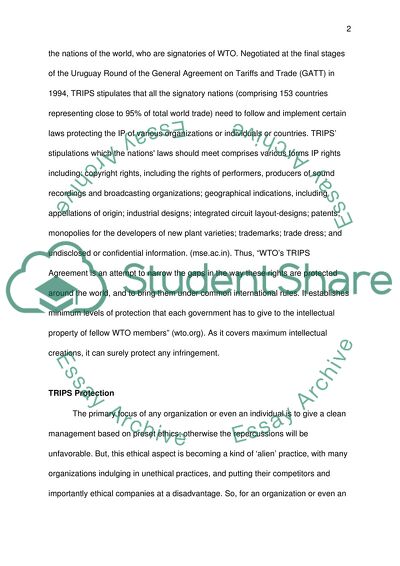
- Home
- Free Samples
- Premium Essays
- Editing Services
- Extra Tools
- Essay Writing Help
- About Us
- Studentshare
- Subjects
- Miscellaneous
- Comment on whether the Patent provisions in TRIPS provide reasonable protection for traditional knowledge as well as patents
Comment on whether the Patent provisions in TRIPS provide reasonable protection for traditional knowledge as well as patents - Essay Example

- Subject: Miscellaneous
- Type: Essay
- Level: Undergraduate
- Pages: 4 (1000 words)
- Downloads: 0
- Author: schmittantwan
Extract of sample "Comment on whether the Patent provisions in TRIPS provide reasonable protection for traditional knowledge as well as patents"
Protected in the sense, the organization or the creator or the inventor who came up with the product, should be given some rights over it. They should be allowed to enjoy the financial and other benefits incurred from it, thereby preventing others from illegally duplicating the product or services and being detrimental to the original manufacturers and inventors. So, this paper will discuss how Trade-Related Aspects of Intellectual Property Rights (TRIPS) provides good protection for traditional knowledge as well as patents, thereby being really helpful to business organizations.
Administered by World Trade Organization (WTO), Trade Related Aspects of Intellectual Property Rights (TRIPS) is an international agreement which establishes minimum standards for the various forms of intellectual property (IP) regulations for the nations of the world, who are signatories of WTO. Negotiated at the final stages of the Uruguay Round of the General Agreement on Tariffs and Trade (GATT) in 1994, TRIPS stipulates that all the signatory nations (comprising 153 countries representing close to 95% of total world trade) need to follow and implement certain laws protecting the IP of various organizations or individuals or countries.
TRIPS’ stipulations which the nations laws should meet comprises various forms IP rights including: copyright rights, including the rights of performers, producers of sound recordings and broadcasting organizations; geographical indications, including appellations of origin; industrial designs; integrated circuit layout-designs; patents; monopolies for the developers of new plant varieties; trademarks; trade dress; and undisclosed or confidential information. (mse.ac.in). Thus, “WTO’s TRIPS Agreement is an attempt to narrow the gaps in the way these rights are protected around the world, and to bring them under common international rules.
It establishes minimum levels of protection that each
...Download file to see next pages Read MoreCHECK THESE SAMPLES OF Comment on whether the Patent provisions in TRIPS provide reasonable protection for traditional knowledge as well as patents
The Dsu in Operation - from Complaint to Resolution
Enforceability at the National Level in the United Arab Emirates
Patenting of Pharmaceuticals Conflicts with the Competing Rights of Individuals
Intellectual and Modern Property
The Primary Purpose of the UK Housing Act 2004
Patient Autonomy As One of the Most Central Ethical Principles in Medical Law
Invention Rights at the Work Place in New Zealand
The Definition of Intellectual Property

- TERMS & CONDITIONS
- PRIVACY POLICY
- COOKIES POLICY